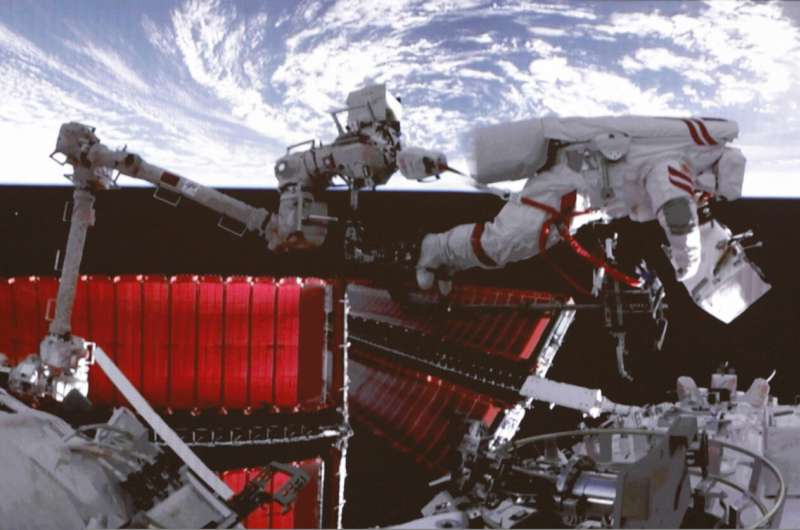
Copernical Team
Got Rock Sample: Sol 3755
 I am pleased to report that the tactical operations team had a successful morning as we were able to acquire a sample of the Tapo Caparo bedrock. Despite the target rock slab fracturing during drilling, we were able to collect enough sample for analysis by the CheMin and SAM instruments. Our primary goal for Sol 3755 is to drop some of the drill sample into CheMin for analysis, but we have sever
I am pleased to report that the tactical operations team had a successful morning as we were able to acquire a sample of the Tapo Caparo bedrock. Despite the target rock slab fracturing during drilling, we were able to collect enough sample for analysis by the CheMin and SAM instruments. Our primary goal for Sol 3755 is to drop some of the drill sample into CheMin for analysis, but we have sever Rocket Lab establishes Australian Subsidiary to support rapidly growing Space Sector
 Rocket Lab USA, Inc. has established a new wholly-owned subsidiary, Rocket Lab Australia, to explore opportunities to support the expansion of Australia's national space capabilities. The Australian Government has set a goal to triple the size of the Australian space sector from an estimated AUD$4 billion in 2016 to AUD$12 billion and create an additional 20,000 jobs by 2030.
To help facil
Rocket Lab USA, Inc. has established a new wholly-owned subsidiary, Rocket Lab Australia, to explore opportunities to support the expansion of Australia's national space capabilities. The Australian Government has set a goal to triple the size of the Australian space sector from an estimated AUD$4 billion in 2016 to AUD$12 billion and create an additional 20,000 jobs by 2030.
To help facil New insights from an ancient asteroid
 In February 2023, Tohoku University researchers published their analysis of samples retrieved from asteroid Ryugu by Japan's Hayabusa2 spacecraft in the journal Nature Communications. They believe these samples contain the oldest solids from the solar system available for study. The researchers focused on chondrule-like objects and calcium-aluminium-rich inclusions (CAIs), which are key componen
In February 2023, Tohoku University researchers published their analysis of samples retrieved from asteroid Ryugu by Japan's Hayabusa2 spacecraft in the journal Nature Communications. They believe these samples contain the oldest solids from the solar system available for study. The researchers focused on chondrule-like objects and calcium-aluminium-rich inclusions (CAIs), which are key componen Successful flight acceptance hot test of CE-20 cryogenic engine
 On February 24, 2023, the Indian Space Research Organisation (ISRO) successfully conducted a flight acceptance hot test for the CE-20 cryogenic engine, which is set to power the Cryogenic Upper Stage of the LVM3 launch vehicle for the upcoming Chandrayaan-3 Mission. The test was carried out at the ISRO Propulsion Complex, located in Mahendragiri, Tamil Nadu, India.
The CE-20 cryogenic engi
On February 24, 2023, the Indian Space Research Organisation (ISRO) successfully conducted a flight acceptance hot test for the CE-20 cryogenic engine, which is set to power the Cryogenic Upper Stage of the LVM3 launch vehicle for the upcoming Chandrayaan-3 Mission. The test was carried out at the ISRO Propulsion Complex, located in Mahendragiri, Tamil Nadu, India.
The CE-20 cryogenic engi SwRI researching ARM, RISC-V processors for faster spaceflight computers
 Southwest Research Institute is evaluating the next generation of fast and reliable microprocessors used in embedded spaceflight systems. During the IEEE Aerospace Conference March 4-11 in Big Sky, Montana, SwRI engineers will present a pair of research papers comparing legacy spaceflight computers to new technology that performs more complex tasks using less power.
"Conventional spaceflig
Southwest Research Institute is evaluating the next generation of fast and reliable microprocessors used in embedded spaceflight systems. During the IEEE Aerospace Conference March 4-11 in Big Sky, Montana, SwRI engineers will present a pair of research papers comparing legacy spaceflight computers to new technology that performs more complex tasks using less power.
"Conventional spaceflig Rocket Lab set for dual launch campaigns in Virginia and New Zealand
 Rocket Lab USA is preparing to launch two dedicated missions in March from the Company's launch sites in the United States and New Zealand - within days of each other. One Electron rocket is ready and in position at Rocket Lab Launch Complex 1 in New Zealand to deploy satellites for Spaceflight Inc. customer BlackSky (NYSE: BKSY), a real-time geospatial intelligence company. Meanwhile, a second
Rocket Lab USA is preparing to launch two dedicated missions in March from the Company's launch sites in the United States and New Zealand - within days of each other. One Electron rocket is ready and in position at Rocket Lab Launch Complex 1 in New Zealand to deploy satellites for Spaceflight Inc. customer BlackSky (NYSE: BKSY), a real-time geospatial intelligence company. Meanwhile, a second ESA recruits – and not only astronauts. Apply now!

In 2023, ESA will be recruiting over 200 new colleagues to join our teams and support our mission of the peaceful exploration and use of space for the benefit of everyone. More than 30 vacancies have recently been published and many more will be coming soon, so if you are ready to take the next step in your career, this is your chance! Explore our vacancies and apply today.
Liquid nitrogen spray could clean up stubborn moon dust

A liquid nitrogen spray developed by Washington State University researchers can remove almost all of the simulated moon dust from a space suit, potentially solving what is a significant challenge for future moon-landing astronauts.
The sprayer removed more than 98% of moon dust simulant in a vacuum environment with minimal damage to spacesuits, performing better than any techniques that have been investigated previously. The researchers report on their work in the journal, Acta Astronautica.
While people have managed to put men on the moon, they haven't figured out how to keep them clean there. Similar to the clingiest packaging peanuts, moon dust sticks to everything that it touches. Worse than the packing peanuts, the dust is composed of very fine particles that are the consistency of ground fiberglass.
"Moon dust is electrostatically charged, abrasive and gets everywhere, making it a very difficult substance to deal with," said Ian Wells, first author on the paper and a senior in WSU's School of Mechanical and Materials Engineering.
China says will train foreign astronauts for space station

China says it will soon begin training foreign astronauts for trips to its newly completed orbiting space station.
Long a source of national pride and symbol of technological advancement, the Chinese space program is taking on a new diplomatic and political role, much in the way the United States and former Soviet Union leveraged theirs.
Surgeon, scientist named Japan's first new astronauts in 13 years

Japan's space agency JAXA named its first new astronaut candidates in over 13 years on Tuesday, with a surgeon and a climate scientist chosen from more than 4,000 applicants.
Ayu Yoneda, a 28-year-old surgeon for Tokyo's Japanese Red Cross Medical Center, will become just the third woman ever to join the space training programme. Japan's six current astronauts are all men.
She will be joined by Makoto Suwa, 46, a senior disaster risk management specialist at the World Bank, who made the cut after an unsuccessful first application more than a decade ago.
Yoneda said she was "elated and surprised" to learn she had been chosen.
"I felt a sense of responsibility and mission," she told reporters.
Suwa, speaking by video from the United States, said he was "so excited that I haven't been able to sleep".
The pair, chosen from 4,127 applicants, will now begin a two-year training programme and, if successful, could join International Space Station missions and become the first Japanese astronauts to reach the Moon.
